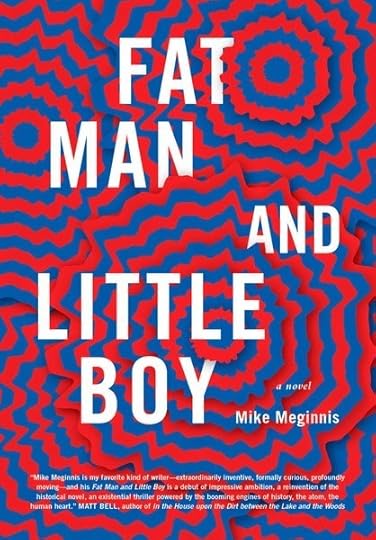Greg Mitchell's Blog, page 54
August 12, 2014
Bombs Hit the Road
 Once again this year--as I've done for thirty years--I've written or revised and posted numerous pieces related to the atomic bombings of Japan in August 1945. As many of you know, I have also written three books on the subject (find them over on the right rail of this blog), including the acclaimed and best-selling Hiroshima in America, co-authored by the great Robert Jay Lifton. But now I'd like to highlight a (yes) quirky new novel.
Once again this year--as I've done for thirty years--I've written or revised and posted numerous pieces related to the atomic bombings of Japan in August 1945. As many of you know, I have also written three books on the subject (find them over on the right rail of this blog), including the acclaimed and best-selling Hiroshima in America, co-authored by the great Robert Jay Lifton. But now I'd like to highlight a (yes) quirky new novel.It's titled Fat Man and Little Boy (also the title of a not-bad Roland Joffe film many years ago), which of course refers to the names of the bombs dropped on Hiroshima and Nagasaki. Here's how the author, Mike Meginnis, describes his inspiration: As a student when he learned of the names "it made me unspeakably sad. I didn’t understand why anyone would choose to anthropomorphize such terrible weapons. To give them even a measure of humanity struck me as cruel to the bombs themselves. It gave them a ghost of agency, a fictional consciousness. It’s not much, but nobody needed to do that. I began to think about the sort of people Fat Man and Little Boy would be."
Huh? Well, the publisher, Black Balloon, describes it this way: "In this powerful debut novel, the atomic bombs dropped on Japan are personified, born on impact as human beings—as a Fat Man and a Little Boy. Their small measure of humanity is a cruelty the brother bombs must suffer. Given life from death, they travel west from Japan to France and later to America. Their journey is one of surreal and unsettling discovery, and author Mike Meginnis transforms these symbols of mass destruction into beacons of longing and hope."
Well, I'll be curious to read how (or if) he pulls off--and his message on the actual use of the bombs (in their own birth/death) which, after all, killed 200,000 people, the vast majority civilians. You can pre-order now at link above.
Published on August 12, 2014 09:58
That 'NYT' Gaza Casualty Count
Tuesday: The BBC did its own casualty count probe five days ago, following much of the same line as NYT, but today changed a key segment early in the piece. Before, it read: "Nonetheless, if the Israeli attacks have been 'indiscriminate', as the UN Human Rights Council says, it is hard to work out why they have killed so many more civilian men than women. " Today it's changed to: "Nonetheless, the proportion of civilian men over 18 killed seems high and it is not immediately obvious why."
They also added this:
Another response to Rudoren's skewed "counting," as a leading group says it has penned letter to the NYT editor in protest.
Monday: I wrote a widely-linked piece last week about a particularly egregious NYT story by Jodi Rudoren which reflected Israel's spin that about half of all deaths in Gaza are "combatants/terrorists" and not civilians, vs. every other estimate, including the UN's, placing the figure at maybe 15-25%. Patrick Connors, who has given me a few tips on other stories and penned some valuable pieces himself, is just out with a full probe of the same NYT piece and graphic. He makes several good points, although his basic one is that the Times considers the cut-off age for children at 14. And as I noted before, they also consider males 20 to 29 as likely "militants" even though there is no evidence for lumping so many of them in that category. Connors did get a couple responses from Rudoren herself.
They also added this:
Jana Krause, from the war studies department at Kings College London, says: "A potential explanation other than combatant roles could be that families expect them to be the first ones to leave shelters in order to care for hurt relatives, gather information, look after abandoned family homes or arrange food and water.
"Similar to combatant roles, these would be 'high-risk' social roles that young men are often expected to fulfil."
She stressed that more work would be needed on the ground to determine why this group was over-represented in the casualty figures.
Men of this age may also be mistaken for fighters because they fit the age profile.
Another response to Rudoren's skewed "counting," as a leading group says it has penned letter to the NYT editor in protest.
Monday: I wrote a widely-linked piece last week about a particularly egregious NYT story by Jodi Rudoren which reflected Israel's spin that about half of all deaths in Gaza are "combatants/terrorists" and not civilians, vs. every other estimate, including the UN's, placing the figure at maybe 15-25%. Patrick Connors, who has given me a few tips on other stories and penned some valuable pieces himself, is just out with a full probe of the same NYT piece and graphic. He makes several good points, although his basic one is that the Times considers the cut-off age for children at 14. And as I noted before, they also consider males 20 to 29 as likely "militants" even though there is no evidence for lumping so many of them in that category. Connors did get a couple responses from Rudoren herself.
Published on August 12, 2014 09:30
Rubin of 'NYT' Hurt in Crash
 We've followed Alissa Rubin as she's covered wars for many years. Today she went down in a copter crash covering the Kurd-Isis war, got at least broken wrists and concussion, as pilot died. Allegedly an accident. A photog with her was not badly hurt.
We've followed Alissa Rubin as she's covered wars for many years. Today she went down in a copter crash covering the Kurd-Isis war, got at least broken wrists and concussion, as pilot died. Allegedly an accident. A photog with her was not badly hurt.
Published on August 12, 2014 08:46
Public Editor Hits 'Times' on Perlstein 'Plagiarism'
Margaret Sullivan, the NYT's public editor, just out with blog post on the paper's prominent piece on those "plagiarism" charges against Rick Perlstein. The paper, she finds, still largely defends but she is largely critical. As she note, it's serious charge to be left as he said/she said, especially with a left/right political context. "The Times article amplified a damaging accusation of plagiarism without establishing its validity and doing so in a way that is transparent to the reader. The standard has to be higher."
Published on August 12, 2014 07:04
Richard and Robin
Thinking today also of poor Richard Manuel, another death-by-hanging. I supppose "The Shape I'm In" is apt. Or "I Shall Be Released." Maybe "You Don't Know Me."
Published on August 12, 2014 05:50
Be My, Be My Little Bibi
 Fun quiz over at the Intercept asks, who said it--Netanyahu or Hillary Clinton? As I noted yesterday, her recent quotes to the hawkish side of Obama, and over-the-top defense of Israel, ought to send her backers scrambling for another candidate while there's still time.
Fun quiz over at the Intercept asks, who said it--Netanyahu or Hillary Clinton? As I noted yesterday, her recent quotes to the hawkish side of Obama, and over-the-top defense of Israel, ought to send her backers scrambling for another candidate while there's still time.
Published on August 12, 2014 05:43
August 10, 2014
Buzzfeed's New Backers
As you may have heard, giant firm Andreessen Horowitz pumping $50 million into Buzzfeed now. The Andreessen, of course, is Marc, who backed Obama in 2008 but then endorsed Romney to the tune of at least $100,000 in 2012. Love this from Business Insider back then:
The Horowitz is Ben Horowitz--son of David Horowitz, the former left-winger turned militant rightwinger.
He has contributed $100,000 to Republican presidential candidate Mitt Romney's campaign via a SuperPAC.
Andreessen is the biggest fish there is in Valley right now. He's on the board of Facebook and HP. He's already a huge investor in startups through his VC firm, Andreessen Horowitz, and he still has billions more to seed.
In this CNBC clip, Andreessen says he supports Romney because he is a "dyed-in-the-wool" businessman who understand that "regulations" get in the way of business.
Andreessen says he used to support Democrats – like Clinton/Gore, for example – but "I turned 40 last year and so I figured it was time to make the switch."Another quote here: “You do not get a high-end, professional CEO running for president very often.” This George Packer piece in The New Yorker reveals that his office is sort of "Mad Men" style and he owns the old record player that sat on the desk of that show's Pete Campbell for three seasons.
The Horowitz is Ben Horowitz--son of David Horowitz, the former left-winger turned militant rightwinger.
Published on August 10, 2014 18:24
Update: That's Oil, Folks
Wow: And now the esteemed expert on the region, Steve Coll, at the The New Yorker agrees on the oil focus, calling Erbil a "gold rush town" like Deadwood. "Obama’s defense of Erbil is effectively the defense of an undeclared Kurdish oil state whose sources of geopolitical appeal—as a long-term, non-Russian supplier of oil and gas to Europe, for example—are best not spoken of in polite or naïve company, as Al Swearengen would well understand. Life, Swearengen once pointed out, is often made up of 'one vile task after another.' So is American policy in Iraq.
Earlier:
John Judis says Obama's "humanitarian" intervention in northern Iraq is actually "all about the oil." Not sure about the "all" but surely "partly" or "mainly."
Earlier:
John Judis says Obama's "humanitarian" intervention in northern Iraq is actually "all about the oil." Not sure about the "all" but surely "partly" or "mainly."
In portraying American intervention in Iraq as a purely humanitarian effort, Obama is following the script he read from in Libya, when he justified American intervention as an effort to prevent a massacre in Benghazi. In a March 28, 2011 address to the nation, Obama painted the American intervention as a response to “brutal repression and a looming humanitarian crisis.” Oil was not mentioned, even though Libya was the world’s sixteenth-largest oil producer in 2009 and a major supplier to Europe. But oil was most likely involved, as became clear when, after preventing a massacre in Benghazi, the United States and its coalition partners stuck around to topple the regime of Muammar Qaddafi. If the Obama administration wanted to prevent the world’s peoples from brutal dictators and repressive regimes or from takeovers by terrorist groups, there are other countries besides Libya and Iraq where it could intervene. What distinguishes these two countries is that they are major oil producers.
Published on August 10, 2014 16:30



